British aircraft carrier HMS Queen Elizabeth will visit Japan to “enhance Japan-UK defence cooperation”.
Defence Secretary Ben Wallace and Foreign Secretary Dominic Raab discussed the deployment of HMS Queen Elizabeth during the ‘2+2’ virtual meeting with their respective Japanese counterparts, Ministers Toshimitsu Motegi and Nobuo Kishi.
According to a UK Government statement:
“CSG21, led by UK aircraft carrier HMS Queen Elizabeth, will herald a new era for UK-Japan defence and security cooperation, providing opportunities for the Royal Air Force and Royal Navy and their respective Japanese counterparts to operate together and support opportunities for future collaboration, including on the F35 and Amphibious programmes.”
Both the Foreign and Defence Secretary reaffirmed the UK’s long-term commitment to working closely with Japan to uphold the security of the Indo-Pacific and demonstrate the value of a unified approach to facing global challenges.
Defence Secretary Ben Wallace said:
“Japan and the UK have forged a close defence and security partnership that is being elevated to new heights this year when the UK Carrier Strike Group visits the Indo-Pacific. The most significant Royal Navy deployment in a generation demonstrates the UK’s commitment to working with our partners in the region to uphold the rules-based international system and promote our shared security and prosperity.”
Foreign Secretary Dominic Raab said:
“Japan is a key security partner for the UK, and a close, enduring friend. This year will see our two nations working even more closely together with the UK’s Presidency of the G7 and hosting of the UN Climate Conference. The UK’s Indo-Pacific tilt, including the visit of HMS Queen Elizabeth to the region, demonstrates our shared priorities and common strategic interests from maritime security to climate change and free trade.”
The UK government added that the four ministers agreed that Japan and the UK are each other’s closest security partners in Asia and Europe respectively, with shared values and common strategic interests.
“They resolved to further strengthen cooperation on defence, security and trade in order to uphold those values. A recent Maritime Security Arrangement agreed between the Royal Navy and the Japan Maritime Self-Defense Forces (JMSDF) is one example of how the two countries’ Armed Forces are deepening their relationship.
The arrangement, signed by JMSDF and the First Sea Lord Tony Radakin – head of the Royal Navy – will see the two countries share maritime domain awareness, helping to create a safe environment for international shipping transiting between the Indo-Pacific and Europe. In this spirit, the four ministers committed to further cooperation on monitoring illicit ship-to-ship transfers by North Korea.”
In recent years, the growing defence partnership between the two countries has seen the British Army become the only army other than the US to train with Japanese forces on Japanese soil.
In 2019, Rob Clark advised that at a time of reduced certainty surrounding the security of both the UK and in particular Japan, these two island states are looking at increased military cooperation in order to maximise their respective capabilities.
You can read his article below.
Is increased UK-Japan defence cooperation leading to a new strategic alliance?



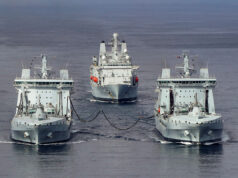


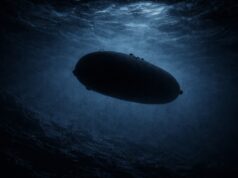
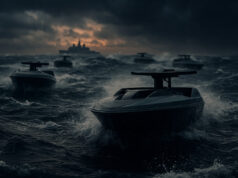
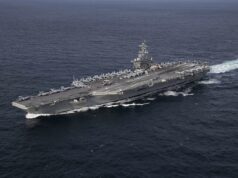
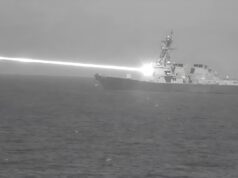
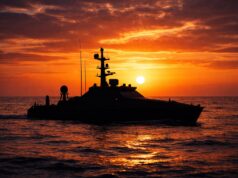
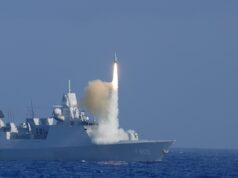


Great
To be expected TBH.
Having QEC and POW changes the carrier arithmetic and allows USN some breathing space.
US were using gator navy such America class to plug the gaps.
It may not seem much NATO going from 11 -> 13 carriers (counting CDG but not the Italian ones as they are not really at the QEC level) but it is very significant.
How odd! I thought a few days ago that HMS Queen Elizabeth should visit Japan. Now this. It is imperative that the United Kingdom is seen to be reacting to China over Hong Kong quite apart from the P.R.C. menacing almost the entire Pacific rim, not least Australia.
Excellent. Japan are natural allies.
“natural” – for the modern historical period you mean
I really don’t get why we are suddenly getting involved in the region. Our interests are closer to home and potentially the middle East with the oil/gas. People initially linked this to brexit and the trade deal but Japan firmly put us in our place and gave us a worse deal than the EU has, so that failed.
The UK has been a global country for centuries – before, during, and after Empire.
Only in the last four decades has EU membership turned our attention inward. Now we have regained our independence, then a return to our world role is a natural step.
I look forward to increased ties with CANZUK and the Anglosphere. And of course, with the Commonwealth of Nations, which has been largely ignored by the UK literati, to the point where the old Commonwealth Institute has been sold off, now home to the Design Museum.
I hate being pugnacious but grew up in Australia and am telling you now Japan is still regarded with a great deal of hatred , as a boy i was taught to sail by an great man , an old Jack Tar as he called himself from Bristol who had served on HMS Renown . His accent was straight out of treasure island and he not only looked like Oliver Reed but was probably wilder , i will never forget him telling me about the fate of the crew of the sister ship who had the misfortune to be taken by the Japanese . Or the Franciscan Brother who was my Math teacher from Scotland who had served in the Forgotten army . That guy never forgave Mountbatten for what ever reason i dont know but had a visceral reaction when ever Japan was mentioned as they were beyond redeeming . Then there is the Australian veterans who , and i am not exaggerating here would have thrown a drink in your face if being at the bar when stating that , irrespective of how rude it would have looked .
We could say the same about the Germans. But time moves on, and now we are close allies.
Germans dont teach the 2nd World war as a just cause , Japan does .
Simply put…brilliant! The renewal of a very old friendship.
yes, from the early 1900’s ….. no from the late 30’s …..
Exactly. In WW1, in pursuit of the treaty with the UK, Japan attacked and seized German possessions in the Pacific. They kept many of them after the war and they played a significant part in Japan’s war of aggression.
Not sure what if anything UK really gained from this.
Likewise, I cannot understand why sending a large part of our deployable navy to the other side of the world is useful or sensible.
Japan’s navy is structured for self defence . Why shouldn’t ours be?
The U.K.’s always looked outwards to trade and stop aggression before it reaches our shores….Armada, Napoleon etc. You needed a strong navy. Today with modern weapons a purely defensive posture could mean not needing a navy at all.
Not really but more thought about what we really need our navy to do wouldn’t hurt.
Looking at current and likely threats, we first need to be able to dominate the NE Atlantic. Countering the renascent Russian submarine threat must be a priority. Yet we are planning just 8 anti- submarine frigates and will have only 7 hunter killer subs. The carriers are impressive but their cost has crowded out more necessary vessels and equipment.
I guess Brexit has changed everything. If we are looking to the pacific/far east for trade, then we need to secure those routes. The navy will grow, the army diminish. A maritime nation.
…although we should not kid ourselves our navy is big enough. Maintaining an east of suez presence without giving up responsibilities closer to home will totally consume the RN as is
You have spelled out exactly my worry. To maintain a regular meaningful presence in the Far East needs a large increase in the size of the RN. But there are no plans for any increase beyond vague references to type 32 frigates. Indeed, with current build schedules and plans for minesweeping, we are more likely to see fewer hulls.
Meanwhile, we escort Russian warships through the channel with OPVs or minehunters.
I read that the planned Far East tour is motivated more by Imperial nostalgia than hard analysis of our real defence needs.
Frankly, if the best task for a carrier task group that the admiralty can devise is a swan around the Pacific, maybe we don’t need carriers at all?
As an advocate for more defence spending, it pains me to draw this conclusion. But others who are less supportive certainly will.
But dont you think its sensible to ‘support’ our friends? There are many people overseas who appreciate knowing they have a friend in the UK. Call it what you will but in no way is it neo-colonialism. Maybe a bit more like diplomats in grey. We send ships worldwide for a number of reasons, training, disaster relief familiarisation with navies of like minded democracies, trade. I don’t know what the fuss is about.
I think we will find an important need for the carriers pretty quickly, if the Myanmar regime heats up the wars against its own peoples. As its an ex British colony, it’s a job for UK to sort out! While the US will hold China at bay at the some time.
The Myanmar military have very close ties with the PRC. Before the tsunami of Dec 2004 the Chinese had a significant presence in the country. India was paranoid about them establishing a Bay of Bengal marine base opposite the Andaman islands with a potential for a direct rail (supply) link back to China.
Western relief agencies were delayed in getting into Myanmar after the tsunami, allegedly to allow the chinese time to pack up and leave.
Pete
Rightly or wrongly this is an expensive ‘lets show off our new toy’ cruise to friendly-ish nations in an area of the planet where we haven’t had much presence recently. Its mutual moral support with Japan only, militarily there is very little we could do for each other in the event of a crisis. Would love to see some cross-decking with their mini-carriers though.
I think that’s bang on Julian. The navy is the only service that can be truly global with the air force backing it up in tactically sensitive areas. We need to give the army a lot of thought before we blunder again into spending on equipment we don’t need.
“Japan’s navy is structured for self defence . Why shouldn’t ours be?”
This was part of the Post WW2 Japanese Constitution. When they decided to raise up a military force, the Japanese Government decided to call them a Self-Defense Force to show countries in the region that there were no plans to return to their aggressive policies prior to WW2.
I should also mention that in the late 19th century & early 20th century, when Japan decided to follow Western countries and industrialize their country, some of the very first ship were British. In fact, they modelled their new navy after the Royal Navy of that era, and many of their Naval Officers received training in the UK..
You have forgotten that Japan is Not a permanent member of the UNSC.
Being a UNSC member brings further responsibilities, like intervention in Sierra Leone which we did in 1999.
China is the enemy.It is jgood to have an ally so close.I to lived a bit in the far east and heard first hand of the Japanese occupation.That was then ,now is now.It is said that during the Boxer rebellion the Japanese were the most well behaved troops involved the French and British the worst,the French for their brutality the British for looting artifacts
The Anglo-Japanese naval alliance ran from 1902 to 1923, it was primarily aimed at stopping Russia and France teaming up against Japan or Britain and it that it worked, France didnt come to Russia’s aid against Japan and Japan supported us during WW1 sending ships to the Med to help guard convoys from U-boats. Unfortunately in the post WW1 settlement the US made Britain and Japan terminating their alliance a condition to agreeing to the Washington naval treaty as they were worried Britain and Japan could team up against them.
thanks for the lesson, didn’t know that…or at least I may have once but forgot
Er, in the 1900s Vickers were happy to ship product.. but in the early fourties, what happened…
WW2.
Not to mention the role of Thomas Glover who from the late 1800’s onwards is generally regarded within Japan as being one if the architects of modern japan including its navy.
I’ve just read up about the Japanese Maritime Self Defence Force. It’s size puts the Royal Navy in the shadows. Amazingly, it’s classed as a self defence force! In truth, it’s probably more capable than the RN.
The Japanese navy would certainly be a tough opponent for anyone attacking Japan.
Japan’s navy doesn’t have the logistics to have the reach. Hence why it is a self defence force.
Some of the Japanese ships are on the older end of things and you do have to wonder how useful they would be even with upgrades.
The main offensive threat of the RN is submarine. Japan has submarines but nothing nuclear and nothing with the legs of the RN ones.
Due to the ramping up of the Chinese military but also the continual threat from North Korea, the Japanese will soon be building a few submarines that are ballistic missile capable, that will be fuel cell powered. Although they have said the missiles will be conventionally armed. Japan has the technical know how and the manufacturing base to build their own nuclear weapons.
They are also converting their two helicopter destroyers to be F35B capable, which could be the start of more cooperation between the UK and Japan.
Certainly true of the F35B and ‘carriers’
Let’s see what happens with the subs.
It’s certainly impressive, but as SB says is very much geared towards regional defence that requires a far shorter reach to the global, expeditionary focused RN.
I’ve no doubt we’d have a bigger RN if we had China and North Korea as well as Russia on our doorstep – that sort of trio must focus the mind!
In many respects you are correct.
However, don’t let the small size of the RN lead you to under estimate its’ continued global reach. The RN has a very high number of globally capable support ships for its’ size. Royal Fleet Auxiliary gives the RN true global reach with the flexibility to quickly redeploy / retask effectively on the fly. Few other navies have that capability.
There is another point to consider. The RN has been deploying globally since the early 18th century and simply has not given up the skill set. The UK’s highly experienced diplomats also play a part in maintaining our global reach as we still have a lot of friends and contacts globally, so even if the RN ships would not be welcome we can often get the RFA into port to pick up supplies.
Interesting game geopolitics.
Cheers CR
Is there any news on whether QE and her battle group will visit the Republic of Korea whilst in the region? As arguably the other major regional ally after Japan, it would make sense. Given the historic tension between Japan and Korea, it could be seen as a snub if QE does not visit Korea.
Might as well call in at South Korea, Vietnam, Taiwan etc but depends on the schedule
Certainly make sense to call in (strangely enough) on Vietnam. We might get a good trade deal on cheap clothing and other stuff to replace Chinese.
That has been happening for quite a bit anyway. A number of manufacture have moved to Vietnam as the cost of labor has risen in China
It’ll be interesting to see where the group visits but imagine East of Suez India, Malaysia, Singapore and Japan are givens with Taiwan and South Korea being other possibles. Wouldn’t be surprised to see elements peeling off to visit Western Australia too.
Visiting Taiwan would certainly rattle China!
I agree, and Taiwan needs to give up its claims to the SCS and etc!
Sri Lanka is rising up the list… why o why was Supreme Cmd based in Kandy?
Ceylon, as it was known then, has some decent ports, Trincomalee is a great harbour, it was a natural place for there RN base. It gets rather hot and sticky though, whereas Kandy is a lot cooler, it being in the mountainous middle of the country.
Because it was dandy.
For obvious reasons I think the exact details will be kept quiet and be subject to change for some time. Imagine what reaction there will be if well ahead of events it’s stated the carrier group will be visiting Korea. There would be endless threats from the North so best to keep everyone on the hop for as long as possible.
Its going to be obvious where we end up and surely there will be leaks from the home countries?
That would be good & wise. S Korea has a substantial navy, like Japan, & is expanding in response to the PLAN build up.
Is it possible that is a sales tour? If Britain fails to keep both carries, makes sense offer one to the japanese.
Regarding Task group visits.
During Ocean Wave which was the last very large RN deployment the TG only went in to a few places as a whole, Fremantle being one of them along with Diego Garcia.
We all got together for exercises etc but on completion we bomb burst on to our own ports of call. We managed Goa, Phuket, Bangkok, Saigon, Singapore, Hong Kong ( I had just left after 3 years there some 5 months earlier so I was I/C of the liaison team and knew where to go), Diego and Mallorca amongst others.
During Cougar 09 it was the same. Stay together for exercises and bomb burst for port visits. It will be the same on this one. So expect visits to lots of places but not all of them by a Carrier. 2 T23 and 2 T45s and a carrier will be able to cover a lot of ports.
Feel sorry for the Sludgemariners though ( NOT!!!)…unless there is a Z berth they don’t get to go to many places.
Choose your branch….you take your chance!
I wonder if the JSDF will look to land on a couple of their own F35Bs and have them gain some experience? The JSDF could do worse than build a licensed version of QE to eventually replace their current “Helicopter cruisers” that will have…fixed wing fighters….
Their constitution is supposed to forbid them from having “any” carriers. Which is why the Izumo class are called helicopter destroyers. However, things are changing in Japan. They have recently amended their constitution, so that their forces can support UN missions overseas. I would not be surprised to see their constitution amended again to allow carriers, especially now that China are building their two CATOBAR ones. Japan is especially more dependent on imports that we are such as oil, gas and metals. So protecting their trade routes will be a primary requirement and a carrier is one of the best tools to do that!
I believe the USS Wasp is pretty much permanently stationed in Japan. I think this ship will be used initially by them, before they try their Izumos, as they will likely be trained by the USMC. But in the future I would not be at all surprised to see Japan deploy a few of their F35B on our carriers. I also think you can definitely add Italy to that list. I suppose you could also add Singapore and South Korea to the list, as they’re also getting F35Bs.
Hi Dave B
Our pilots start deck landing practice in the USA…. do you know if Japanese pilots are training at the same facility, would be good to see their F35’s landing on our Carrier ,on its world tour
thanks Ian
I believe all F35 pilots do initial conversion training in the US at the moment. I haven’t heard anything about Japan’s F35B pilot training though.
Japan is hardening the decks of its Assault landing craft or helicopter carriers so as to land F35b.it presently flies 50 f35b.Its budget is in the 50b range as it is tsking China very seriously.
It is Not true that Japan presently flies F35Bs! Japan has only taken delivery of 22 F-35A’s, out of 100 planned. I have read that Japan plans to procure F-35B’s in the future, I not seen any date of deliverys.
Any further cooperation with such an important country and natural ally can only be a good thing. The US will remain the country’s external security guarantor hopefully for many years to come, but the beefing up of the SDF and the development of partnerships with European players is certainly a smart move from Tokyo.
Really hoping the rumours of the UK either joining, or becoming an observer of the Quad are true.
Time for a proper RN representation at RIMPAC, surely
Biden sees restraining China as a a multi-national effort. Japanese forces exercising with QE task force will be welcomed by the new US administration and by the US Navy.
I totally agree, and help plug gaps in USN carrier presence.
I hope this does lead to a UK-Japanese alliance. This would put China in a geographical squeeze, and increase the influence of the two countries.
They are natural allies. Its time to forget the problems of WW2, just as we did regarding Germany.